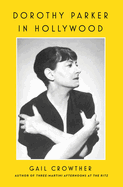
These days, Dorothy Parker is better known for her quick wit and the barbs she would dispense as a member of the famed Algonquin Round Table than for her poems, stories, or other work, especially her years spent writing for Hollywood movies. This era of Parker's life is detailed in Gail Crowther's highly accessible biography Dorothy Parker in Hollywood. Casual fans of the literary icon might not know she won an Oscar for her work on the screenplay for A Star Is Born or the extent to which she loathed her time writing for the silver screen. In fact, Crowther's book acknowledges the many unknowns concerning Parker's life, whether due to paltry archival evidence, studio refusals to credit their writers, or even to Parker's own elusiveness. But Crowther insists the uncertainty is all part of the story, calling it "classic Parker. Both there and not there, both famous and hidden, both forgotten and remembered, both known and unknowable."
Crowther frequently provides a contemporary gloss, distinguishing between the conventions of the era and the norms accepted by today's readers. In this way, she is able to address Parker's life through a feminist lens, scrutinizing her choices while never fully condemning her missteps. Crowther attributes Parker's restlessness to being a woman outside of her time. She argues, "All too often, women who refuse to conform must live and die with this temporal displacement," and Parker certainly refused to conform. Though her story was rarely if ever a happy one, Parker continues to fascinate, and Crowther's biography is a welcome addition to the effort to understand such a complicated woman. --Sara Beth West, freelance reviewer and librarian

